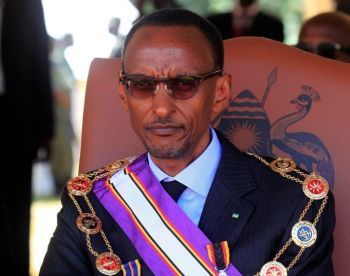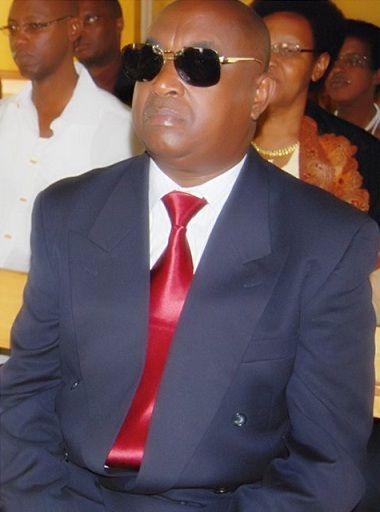Committing Habeas Corpus is no secret in Rwanda’s legal
system. Unlawful detention is part of society for anyone who questions the
authority or the national narrative of the Rwandan government.

Kagame the 'pearl of
Africa'
|
(WASHINGTON DC) - Another damming report has been released about
Rwanda. Amnesty International published a report on October 8, 2012 condemning
the “unlawful detention and torture by military intelligence” and urging Rwanda
to investigate such findings.
The report “Shrouded in Secrecy” is based on seven research
visits to Rwanda between September 2010 and June 2012. Amnesty International
conducted over 70 interviews for this report including with individuals
previously detained by the military, family members of people disappeared and
lawyers. This report explains in great detail how “Between March 2010 and June
2012, Amnesty International documented 45 cases of unlawful detention and 18
allegations of torture or ill-treatment at Camp Kami, Mukamira military camp,
and in safe houses in the capital, Kigali.” Their extensive reporting on
multiple military detention sites as well as safe houses explains how they
obtained their information and what they based their findings on. As one reads
this report it is hard not to compare the same scenario’s to those described in
many publications of how unlawful detention as well as detention camps work in
North Korea.
Deo Lukyamuzi, Commissioner for External Relations, FDU-Inkingi,
stated to this writer that, “There is no surprise in the report. I do find it
naïve that Amnesty International is asking the government to investigate the
claims in the report when the government is the one committing the abuses.”
The report clearly identifies cases of torture, ill-treatment of
detainees, serious beatings that were given during interrogations and the use of
electric shock. While none of these tactics are new to Rwanda or the
international community as a whole when seeking to protect state security of any
country but the difference lies in how Rwanda held prisoners in “incommunicado
detention” in which they were not allowed to contact lawyers or family members.
The AI report states that, “Such incommunicado detention, which includes no
access to lawyers, doctors, and relatives and no judicial review of the
lawfulness of detention, violates Rwanda’s obligations under international law,
including guarantees against arbitrary detention and torture.”

Dr. Gerald Gahima
|
Dr. Gerald Gahima, former Attorney General under President Paul
Kagame and now founding member of the lead opposition group to the current
ruling party in Rwanda had the following to say in regards to this report, “this
is really nothing new. The question, why has it not been possible to hold
President Kagame and his intelligence and so called 'security services'
accountable to date? When do governments that have the means to exert pressure
upon him apply the standards that are applied to other states and
government?”
The AI report details clearly how suspects held were tortured to
the point of giving confessions when they could not take the pain any longer.
Many reported to the organization that they would give false confession in order
to stop from being shocked electrically any further.
General Kayumba Nyamwasa, former Chief of Staff of the army under
President Paul Kagame and founding member of the Rwanda National Congress has
the following statement about the AI report to this writer, “What Amnesty
reported is just a tip of the iceberg. Many families fear to report what has
happened to family members, neighbors or friends. Like all despots, President
Paul Kagame thinks murder, terror, forced disappearances and exile will
perpetuate him in power. He has been reading from the same script like Gadhafi
and Saddam Hussein and may end the same way. Most disturbing is the audacity for
Paul Kagame to deny the obvious in parliament vilifying those asking him to
account instead of answering the right question. Rwandans have suffered so much
under Kagame and we need to turn the page. Right organizations have been
reporting about the appalling records of human rights in Rwanda. This report
should be a wakeup call to international community, so that they can hold
accountable the Rwandan government for those human degrading actions.”
AI clearly reports cases of enforces disappearances where family
members have no information on the whereabouts of their loved ones who were
previously held in these military detention facilities and are unable to obtain
information from local police or the Criminal Investigation Department (CID) in
Rwanda as to their whereabouts. The report states, “After their family member
was transferred to a civilian prison, they later found out that he had been
detained in Camp Kami during this period.”
Rene Mugenzi, a Rwandan human right activist stated, “Right
organisations have been reporting about the appalling records of human rights in
Rwanda. This report should be a wakeup call to international community, so that
they can hold accountable Rwandan government for those human degrading actions.
Furthermore in wake of this report International criminal courts and other
national courts in USA and Europe that are dealing with Rwandan suspected for
various crimes presented by the Rwandan government should re-look in their cases
to investigate if evidence presented and witnesses testimonies presented by the
Rwandan government prosecutor were not obtained under torture and other illegal
and human degrading means as identified in the Amnesty report.”
Committing Habeas Corpus is no secret in Rwanda’s legal system.
Unlawful detention is part of society for anyone who questions the authority or
the national narrative of the Rwandan government.
Jean Paul Turayishimye, Spokesperson for the Rwanda National
Congress stated, “The Justice system in Rwanda is broken. Rwanda has refused to
sign the international convention because it will be obligated to the rule of
law. Justice Minister, Mr. Karugarama and Prosecutor General, Mr. Martin Ngoga
should be ashamed of themselves. They spent their valuable time in law schools
to work against what they are supposed to be defending. Recommendations by the
Amnesty International are simply saying that. Judges are putting the burden of
proof on the defendant instead of the prosecution. You wonder whom these judges
work for.”
Charles Kambanda a legal expert and educator from Rwanda stated
to this writer that, “In my considered opinion, torture of civilians in Rwanda
should not be making news. It is an ordinary evil and actually a culture for
Rwanda's security organs under Kagame. Kagame is the top commander; He even
wondered why his political opponents in prisons do not remain handcuffed
throughout. He said this himself. A US Federal Court found the same thing about
Kagame's Junta, Kagame's army is feared for one major thing; the extent to which
they do torture people.”

Victorie Ingabire
|
In the highly publicized case before the Rwandan Courts currently
is that of Victorie Ingabire, political prisoner held and charged with terrorism
and the infamous yet ambiguous genocide ideology law. Her case has also been
touched with the unlawful practices cited in the Amnesty International report
regarding witness in her case that were held at Camp Kami for seven months prior
to being brought to court. They were denied their legal protections under the
requirement of the International law by being unlawfully detained as well as
being questioned without the presence of a lawyer. Victorie Ingabire’s case has
been riddled with judicial gymnastics and she even ceased to attend court or
allow her attorneys to attend court on her behalf due to the inability to
receive a fair trial in Rwanda. Her sentencing has been delayed for over six
months now and with each scheduled court date the judicial system is able to
find a new reason to postpone her sentencing.
There are overwhelming numbers of cases in Rwanda that provide
evidence to the international community that receiving a fair trial in Rwanda in
nearly impossible. Victorie Ingabires case is crucial to shedding light on how
corrupt the judicial system is in Rwanda.

Rwisereka
|
Former Editor of Umuseso, Charles Kabonero, now living in exile
due to his reporting on the government while living in Rwanda, has this to say
about the Amnesty International report: “The real issue remains what happens,
why and if it can change because in the end the regime in Kigali should be
accountable to Rwandans first. I mean, whether the donors think about Rwanda or
not, it doesn’t replace the fact that if Rwandans are being tortured by the
Kagame regime, can’t express themselves, there is no rule of law and all, it’s
the Rwandans suffering, not the donors. Unfortunately, the level of dictatorship
and set up of the system in Kigali makes it difficult for Rwandans to express
their plight in many of such cases which means that the likes of Amnesty remain
the only critical outlet and it’s a situation that has been created by the
regime which has effectively closed all avenues of free speech. Besides people
fearing such consequences as arbitrary arrests, torture, Rwisereka-like
incidents, you have another section of Rwandans especially those working in
Government who can’t speak out on anything critically for fear of losing their
jobs because the ruling clique has the powers to do so.”
Amnesty International visited Rwanda in June of 2012 to obtain a
response from the Government of Rwanda in light of this report and the
allegation therein before they published its findings but were unable to secure
meetings with high military officials. The AI reports states that, “Brigadier
General Joseph Nzambwita, told Amnesty International that the organization’s
finding were ‘categorically false.’”
The recommendations to the Rwandan Government in the report will
certain go unheeded by this political organization as have all other
recommendations by international groups who call for reforms on the Rwandan
Government due to the governments’ overuse of calling these critical reports by
human rights organization as well as United Nations reports as “biased and
misleading.” Yet, the reccomendations that the AI report gives to foreign
governments, especially development partners in the justice sector and military
cooperation, specifically the call to “Suspend any financial support to
institutions or security forces involved in human rights violations” is where
this will hurt the Government of Rwanda as it has already been seen since July
of 2012 when many international partners to Rwanda have been cutting or
suspending millions of dollars in aid due to Rwanda’s support of a rebel group
in the DR Congo which is destabilizing the eastern region of the country.
How much longer can Rwanda continue to deny what is obvious to
the international community?
No comments:
Post a Comment